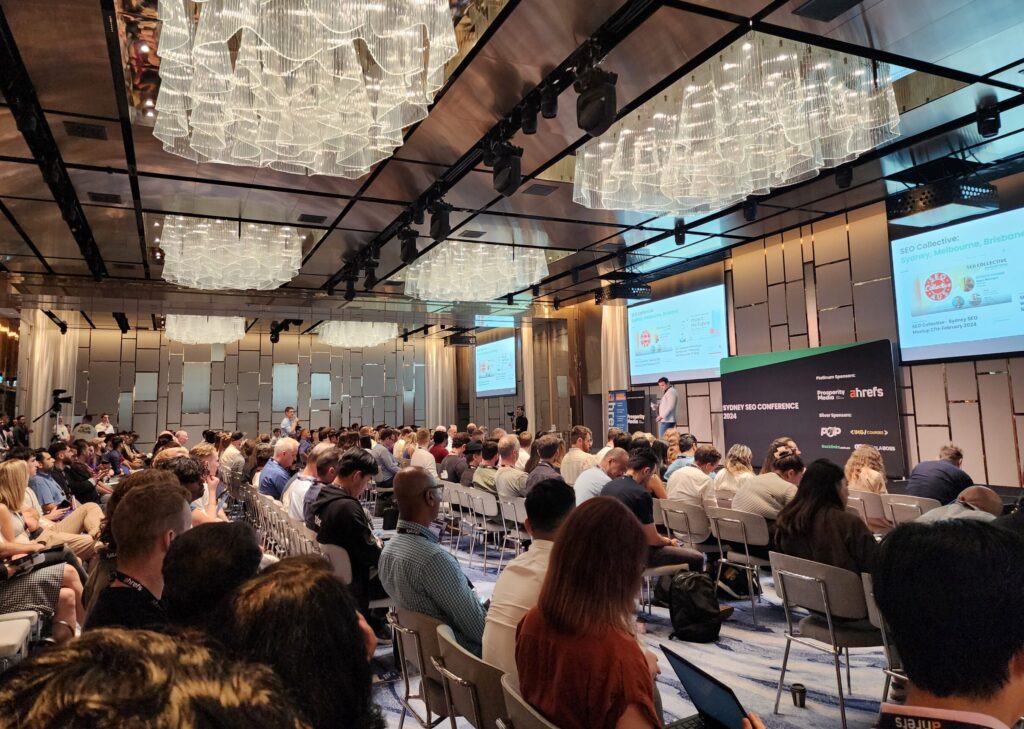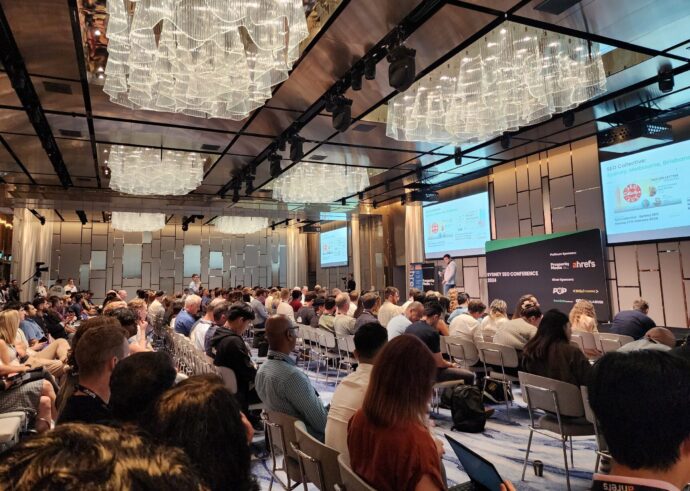At the risk of stating the obvious, the SEO world is constantly changing, and it seems like, more than ever, there’s a whole lot to be across. Yoghurt Digital’s Director, Matthew Forzan, and Organic Search Specialist Dan Xu recently attended the Sydney SEO Conference 2024, Australia’s largest dedicated SEO event, to stay ahead of the curve. Held at Crown Sydney on March 1st, this conference brought together over 300 industry professionals for a day of in-depth exploration into the latest SEO trends and best practices.
The SEO conference provided cutting-edge insights into what’s working, what isn’t working, and explored strategies to adapt. As Matthew and Dan immersed themselves in the discussions, they gathered actionable takeaways and best practices, which we thought we’d share here.
8 Key Takeaways from the SEO Conference Speakers
1. Embrace Automation for Enhanced Efficiency
Automation took centre stage in the session by Sally Mills, senior SEO lead at InfoChoice Group. Tools like XPath extraction and Python scripts can streamline repetitive tasks like redirect mapping for 404s, freeing up SEO professionals for strategic work. As well, Python empowers a deeper understanding of topics by automating intent assignment, topic grouping, and total search volume analysis. This shift from individual keyword focus to holistic topic value paves the way for more strategic SEO approaches.
2. Adapt Strategies for Affiliate and E-Commerce Niches
The session by James Norquay, founder of Prosperity Media, tackled the challenge of e-commerce and affiliate SEO in 2024 and how to stand out in a crowded market despite Google’s 82% dominance. High-quality, unique content is key, with Norquay advocating for comparison-based approaches and refreshing existing content. He also stressed the importance of a well-designed website with informative supporting content, a crucial factor for affiliate marketing success.
Norquay offered additional strategies to boost visibility and sales. He highlighted the potential of large language models like Gemini for identifying trending topics and brainstorming linkable content. Practical e-commerce tips included clear CTAs in page titles and capitalising on seasonal sales events like Black Friday. By implementing these takeaways, businesses can significantly optimise their online storefront performance in today’s competitive landscape.
3. Embrace the Power of Local SEO
Local SEO Consultant Greg Gifford highlighted the crucial role of local SEO. With almost every purchase starting online, local businesses need a strong local SEO strategy to attract customers. Gifford unpacked actionable strategies:
- Tailored Approach: Local businesses require a distinct SEO strategy prioritising local search algorithms. It goes beyond traditional SEO, focusing on conversion and user experience.
- Local Content is Key: Content that resonates with the community establishes businesses as local experts and can attract valuable backlinks.
- Master Your Google Business Profile: Fill out all relevant information in Google Business Profiles, except for Service Area, to maximise local search visibility.
- Keyword Strategy: Integrate target keywords and city names strategically across titles, headings, meta descriptions, alt text, and URLs to boost local ranking.
- Get Involved: Building links from local sites and participating in the community strengthens local authority and visibility.
- Embrace Reviews: Actively solicit reviews and respond promptly to feedback to build trust and improve local ranking.
By following these insights, we can significantly enhance a business’s local search presence, connect with local audiences, and gain a competitive edge.
4. Build Greater Trust
Growth Marketer Regan McGregor championed the importance of E-E-A-T in today’s digital world. Here are the key takeaways for building trust and credibility:
- Fight Misinformation: Prioritise transparency and reliability in online content to combat misinformation and earn user trust.
- Expand Your Reach: Build authority beyond your website. Consider platforms like YouTube and LinkedIn, and enhance digital PR for brand representatives.
- Expertise Matters: Back up claims with credible external sources and provide comprehensive author bios to showcase expertise.
- Targeted Content Creation: Leverage platforms like Google Trends and social media to identify trending topics and optimise content for long-tail keywords with high user intent.
5. Scale SEO Efforts with Programmatic Strategies
SEO Consultant Dejan Mladenovski unveiled the power of programmatic SEO for scaling your efforts. AI automates page creation, but a strong data foundation and high website authority are crucial for success. The recipe for programmatic SEO combines data-driven insights with dynamic page templates, informed keyword research, and a sprinkle of ChatGPT. This AI tool can even help identify internal linking opportunities, boosting topical authority and crawlability for your website.
6. Adapt Content Strategies for Enhanced Visibility
Jes Scholz, who’s an organic marketing consultant, challenged the status quo of keyword research, emphasising value and relevance in today’s SEO landscape. With Google prioritising personalised experiences and “zero-click” terms, traditional keyword strategies are evolving. Here’s how to adapt:
- Ditch “Commodity Content”: Google’s algorithms favour fresh insights. Avoid chasing existing keywords and focus on creating valuable, new information.
- Intent Over Keywords: Future-proof your content by targeting topics with clear user intent, not just individual keywords.
- Engagement Matters: High user engagement, particularly with platforms like Gemini, can potentially influence search rankings.
Jes also unpacked product page optimisation tips:
- Leverage Schema Markup: Utilise Google’s product schema markups to ensure key product details are included for better visibility.
- Analyse User Intent: Identify core identifiers users search for by analysing Google Shopping listings and faceted navigation.
- Internal Linking is Key: Implement internal linking to connect product pages with relevant categories, improving site structure and SEO.
- Embrace Automation: Use tools like ChatGPT to optimise content at scale, but provide clear instructions and existing data for best results.
7. Strategise for Effective Digital PR
Digital PR Director Jonas Grünfeld’s shed light on the art of digital PR. The key takeaway? Tailor your content to resonate with publishers. Here’s how:
- Speak Their Language: Identify topics relevant to specific publishers and mimic their tone of voice to craft compelling pitches that resonate.
- Leverage Brand Mentions: Don’t miss opportunities! Utilise existing brand mentions and nurture relationships with publishers to build brand authority and increase visibility.
By understanding publisher preferences and personalising your approach, you can significantly improve your chances of landing valuable placements.
8. Optimise Internal Linking for Enhanced SEO Performance
Senior Technical SEO Consultant and Google WTM Ambassador Nik Ranger emphasised the power of internal linking in improving SEO performance. Machine learning and powerful tools can now unearth internal linking opportunities, boosting topical authority and website crawlability. Plus, leveraging GSC API data allows for strategic prioritisation, ensuring your internal links amplify the most important pages.
Empowering Your SEO Future
The Sydney SEO Conference 2024 equipped Yoghurt Digital with even more strategies and best practices to provide exceptional results for our clients, ensuring their continued success in a shifting digital landscape. We’re committed to constant innovation and adaptation, so stay tuned to see how we action these tactics to propel brand performance ahead of the curve.



